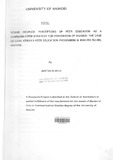| dc.description.abstract | This study examined perceptions of young people on peer education as a communication strategy for the prevention and control of HIV/AIDS with specific reference to GOAL Kenya’s peer education projects in Mukuru slums of Nairobi. Current trends on HIV/AIDS prevention and control programming indicate that peer education has become an integral part of interventions that focus on young people. However little has been done with regard to how young people perceive peer education and peer educators, and ultimately little is known about how perception impact on effectiveness of peer education. The study therefore set to determine how young people perceive peer educators and peer education in the prevention and control of HIV/AIDS and to determine how young people’s perception impact of GOAL Kenya’s Peer Education Project on HIV/AIDS prevention and control among young people in Mukuru slums, Nairobi The study also sought to establish
the views of young people on required improvements/modifications that would make peer education strategy more responsive to their needs in prevention and control of HIV/AIDS.
The sampling frame were young people aged 14-24 years (51% male and 49/o female,) residing within Mukuru slums and also participating in the
GOAL Kenya peer education project Primary data was collected through actual field visits using structured interview questionnaires, observations and focus group discussions (FGDs). The field study was carried out between October 24th-30,h , 2005. The questionnaire was administered to 60 young people living in and working around Mukuru and who are direct beneficiaries of GOAL Kenya ‘s peer education project. Three focus groups (of ten participants each) were also held to probe for more details and gain more in- depth understanding of the situation.Findings indicate peer education strategy provides important sources of
information on HIV/AIDS especially on preventing HIV infections and how to
support relatives and friends to cope with the pandemic. However, the depth
of knowledge of peer educators, accuracy of content and diversity of
information is limiting the effectiveness. Peer educators occupy a slightly
elevated social status from their peers due to their role. It was nevertheless
observed that not all peer educators live up to expectations with some
v
engaging in risky behaviours themselves, such as drug and alcohol abuse
and multiple sex partners. '
The study recommends more comprehensive training to embrace new and
emerging issues and reflect greater diversity in the issues affecting young
people. It also calls for greater accountability by peer educators in the
conduct of their work while at the same time urging peer education sponsors
to be better involved in peer education work in the community.
10
The study also recommends a few follow up researches to be conducted in
order to have a more comprehensive view of peer education in Mukuru.
Other recommendations also include better coordination between the young
people, peer educators, the community and the sponsoring agency, GOAL. | en_US |



